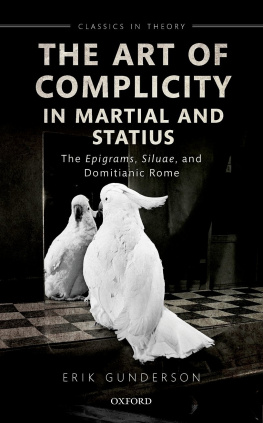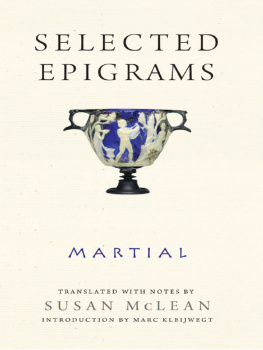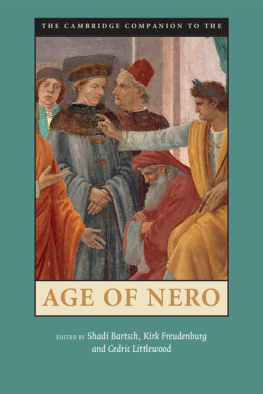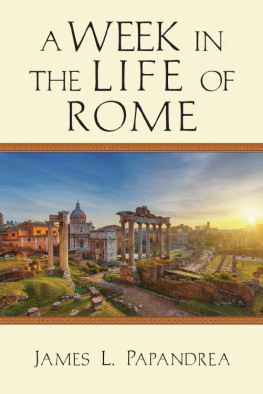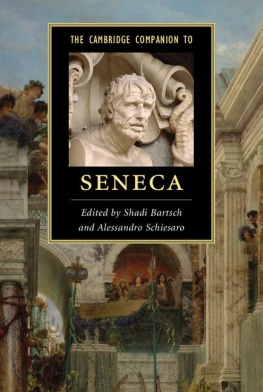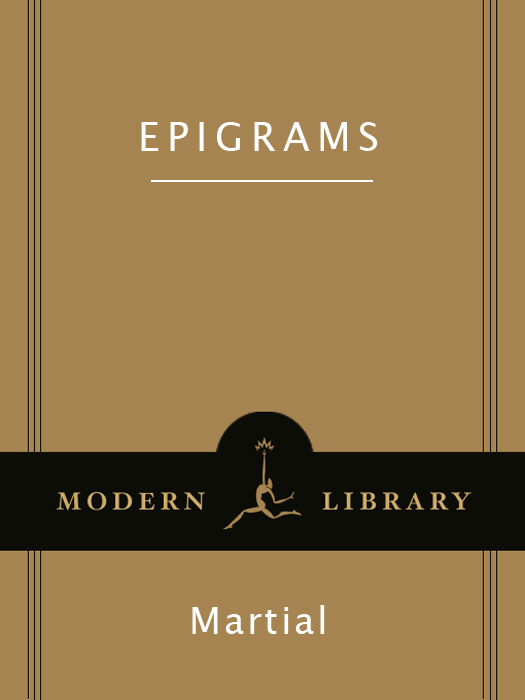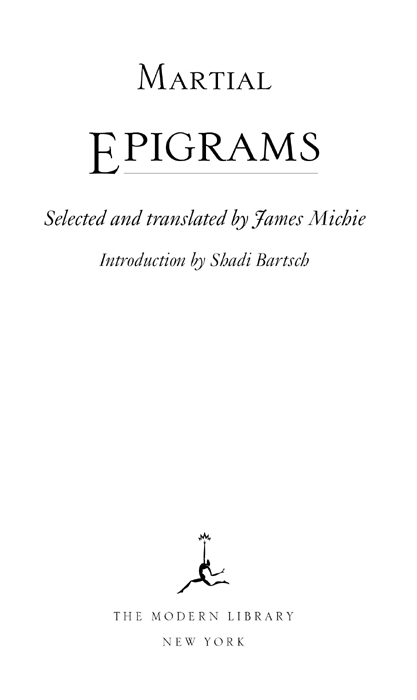Translations and notes copyright 1972 by James Michie
Preface copyright 1972 by Peter Howell
Introduction copyright 2002 by Shadi Bartsch All rights reserved under International and Pan-American Copyright Conventions. Published in the United States by Modern Library, a division of Random House, Inc., New York. M ODERN L IBRARY and the T ORCHBEARER Design are registered trademarks of Random House, Inc. LIBRARY OF CONGRESS CATALOGING-IN-PUBLICATION DATA
Martial.
[Epigrammata. English & Latin. ed. / introduction by Shadi Bartsch.
p. cm.(The Modern Library classics)
Includes index.
eISBN: 978-0-307-80313-9
1. cm.(The Modern Library classics)
Includes index.
eISBN: 978-0-307-80313-9
1.
Epigrams, LatinTranslations into English. I. Michie, James. II. Title.
III. Series.
PA6502 .M45 2002
878.0102dc21
2002022343 Modern Library website address: www.modernlibrary.com v3.1
M ARTIAL
Marcus Valerius Martialis was born in the town of Bilbilis in the Roman province of Hispania Tarraconensis around 40 A.D.
Little is known about his early life except that his parents gave him an excellent literary education and he was very fond of the countryside of his childhood, a subject he visited frequently throughout his writings. At the age of twenty-four, Martial left Spain for Rome in order to continue his education. Although from a fairly modest background, his family was not entirely without connections in the capital, and he found himself immediately supported by the poet Lucan and the philosopher Seneca, fellow Spaniards who immediately introduced him into the society of wealthy patrons in the circle of the political leader Gaius Calpernius Piso. The court of the emperor Nero, though plagued with political intrigue and violence, was nonetheless welcoming to writers, whose presence fed the emperors misconception of himself as a poet presiding over a circle of fellow artists. Lucan, Seneca, and the playwright Petronius all held sway over Nero, especially early in his principate, and Nero, before his descent into tyranny, considered them among his closest friends and advisors. Martials fortunes suffered when, a year after his arrival, the plot led by Piso to assassinate the emperor was discovered and the conspirators, including Lucan and Seneca, were killed.
Despite the loss of his earliest and most influential supporters, Martial had already gained at least minor notoriety and had established the patronage of a variety of wealthy Romans, exchanging privately circulated occasional verses, poems composed for events such as dinner parties or festivals, in return for gifts and social advancement. The early years of Martials career were difficult ones and he endured constant financial hardship, complaining bitterly throughout his later epigrams of the stinginess of his patrons. Despite his poverty he was well acquainted with the Roman aristocracy, and he counted among his friends the most important writers of his time, including Pliny, Frontinus, Juvenal, and Quintilian. By 80 A.D. his reputation was well enough established that he was asked to writepossibly by the new emperor, Titus, himselfthe first of his extant works, a series of epigrams celebrating the games dedicated by Titus to the opening of the newly constructed Colosseum, a minor and incomplete collection now known as the Liber Spectaculorum. Martial produced two other minor works within the following five years, the Xenia and the Apophoreta (now conventionally referred to as Books XIII and XIV of his Epigrams), both of which are collections of short sayings intended to accompany gifts given to parting houseguests.
It was in 86 A.D. that Martial produced the first of the works for which he was to be remembered, his twelve books of collected epigrams. Although the art form had its roots in ancient Greek funerary inscriptions, the epigrams written by Martial were more directly influenced by later Hellenistic poets who treated more commonplace subjects. Martial followed their example by applying the form to everything he observed, criticizing and praising all aspects of Rome in a technique that he perfected: he would begin with an elegantly composed description and follow it with a witty and unexpected conclusion, the so-called sting in the tail. Although his epigrams were not as refined in their subject matter as those of his predecessors, his impeccable style and wit make them the greatest examples of the form ever composed. In his corpus of nearly twelve hundred epigrams, Martial treats every conceivable subject in Roman life, and, as a collection, they are absolutely invaluable as a source of information on the lifestyle of aristocratic Roman society.
At the height of his career, Martials epigrams were read throughout the Roman empire, and each new book was eagerly awaited by a wide audience. He continued to publish regularly for the next decade and won the favor of the most important men in Rome, including the emperor Domitian, whom he flattered unabashedly, for which he was favored with several distinctions, including an honorary military tribunate that conferred upon him equestrian status. Although Martial himself was quick to point out that he earned greater social than financial rewards, it was at this time that he received a modest house within Rome and a small villa in the country just north of Rome. In 96 A.D. Domitian, as a result of dictatorial policy and tyrannical rule, was assassinated, and Martial found that his constant flattery of the reviled emperor put an awkward strain on his position under the new emperor, Nerva. , to leave Rome on a voyage funded by his friend Pliny. , to leave Rome on a voyage funded by his friend Pliny.
He retired to an estate in Bilbilis that had been donated by a local patron and there published his last book of epigrams, a collection that, despite his joy at returning home, betrayed a sense of longing for the urban life he had left behind at the capital. Martial never returned to Rome and his death can be dated no later than 104 A.D.
C ONTENTS
I NTRODUCTION
Shadi Bartsch
When Marcus Valerius Martialis imagined an ordinary Roman picking up a volume of his
Epigrams, the response our poet anticipated from his reader was anything but ordinary: He blushes, turns pale, reels, yawns, curses. It is fortunate for Martial that this was all to the goodThats what Im after. Bravo, verses! (VI 60.34, in James Michies translation), since readers throughout the centuries have been all too ready to respond with outrage as well as a chortle to these sometimes hilarious, sometimes hair-raising verses. Martials
Epigrams have been praised for their slice of life quality as well as condemned for their misogyny, obscenity, and flattery, the last mostly directed at those equipped to help the poet along with a well-timed handout or two, or at the decidedly unstable Emperor Domitian.
Readerly appraisals of this oeuvre, which have fluctuated through the centuries, reached a nadir of disapproval in the nineteenth century, when invocations of nausea can be found several times as a reaction to Martials books. The best-known example would have to be Lord Macaulays famous comments: I have now gone through the first seven books of Martial, and have learned about 360 of the best lines. His merit seems to me to lie, Yet one wonders if such a response would have troubled Martial, whose own moments of fawning over potential patrons are matched by a keen eye that targets, and lambastes, this trait in others, and who seems well aware of hypocrisy as a founding principle of human nature. Even we readers are to be charged with it: the more proper among us will blush and put our Martial downin companyyet, absent a viewer, we pick it up again (XI 16.910). Indeed, part of the amusement this poetic persona generates is precisely due to his insouciance about what weor his original readersmight think of his ethics. True, he admits, he cadges for dinner invitationsbut so do the very patrons he cadges from: I angle for your dinner invitations (oh, the shame Of doing it, but I do it!).



